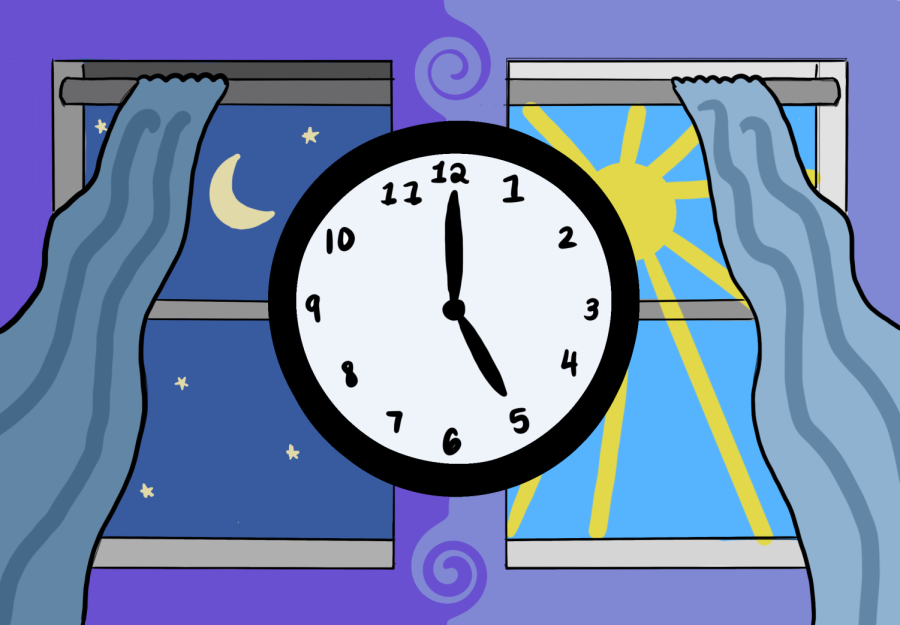Students and Staff Thoughts on Daylight Saving Time — Is It Worth Losing Sleep Over?
“The only positive is getting an extra hour of sleep, but then you lose an hour so it doesn’t seem like a positive,” sophomore Owen Kuntz said.
November 16, 2022
Every November and March, the time changes, either falling back an hour or springing forward an hour, and almost everyone living in the U.S. must adjust their clocks to follow what is called standard time or daylight saving time.
Throughout the country, there are many different opinions on this twice-a-year switch, including students and staff at La Salle. Three members of the community shared their opinions on daylight saving time, and the effects it has on the country and themselves.
In Oregon, all clocks were turned back one hour to resume standard time on Nov. 6 — the first Sunday of the month — at 2 a.m. All states in the country turned back their clocks except for Arizona and Hawaii, which don’t observe daylight saving time.
Sophomore Owen Kuntz said, “depending on where the shift is, it’s helpful,” but when Oregon fell back on Nov. 6, he felt some differences in his sleep schedule, impacting the rest of his day. “[It] takes a while for my body to get used to that,” he said.
Junior Violet Sheehan had similar feelings. “I really thought with the falling back I would be more refreshed,” she said. “But I was exhausted.”
In March of 1966, the Federal Uniform Time Act was passed. This act allowed states to not observe daylight saving time, but they must stay in standard time rather than daylight saving time.
Multiple states want to stay in daylight saving time, rather than the standard time, including Oregon and its West Coast neighbors, California and Washington. If Oregon were to decide to continue, it would be a battle with Congress because the Sunshine Protection Act — which would make daylight saving time the permanent standard time — has not passed the House.
If implemented, this would mean that, from November to March, the sun would rise later, and there would be more daylight in the evening. The Act was passed by the Senate on Mar. 15, 2022, but has been on hold in the House since then.
Daylight saving time originated during World War I. The United States followed Germany’s lead by observing daylight saving time in order to conserve energy and power. Kuntz believes that now that the U.S. is not in a war, it is not needed. “When there is not a lot of constant conflict over the world, then it doesn’t seem necessary at all,” he said.
A study done at Northwestern Medicine showed that in the week after daylight saving time begins in the spring, there are spikes in car accidents, stroke rates, heart attacks, mental health issues, and more. Junior Violet Sheehan said that daylight saving time is not beneficial, considering the health risks that correlate. “Since it has such bad impacts, it doesn’t really seem worth it,” she said.
Although there are some very severe effects of daylight saving time that may not affect everyone, there are also some that will affect most people. According to Northwestern Medicine, daylight saving time can cause sleep issues and fatigue, which ultimately feels like jet lag.
Kuntz noticed this effect on himself during this previous fall back. “I noticed the sleep thing, I think the entire week after,” he said. “I was just really drained and just constantly tired.”
Along with the negative effects, there are also positive ones. When the school day begins, science teacher Mr. Matthew Owen appreciates the sun in the sky. “I am a big fan of being able to start the school day and the sun is up outside as opposed to it being dark,” he said.
In addition to the time the sun rises, Kuntz said he has experienced some positive effects from daylight saving in his personal life, especially in giving him ample time to rest while preparing for La Salle’s fall play, “Puffs.” “I had shows last weekend,” he said. “So getting an extra hour of sleep was really helpful.”






